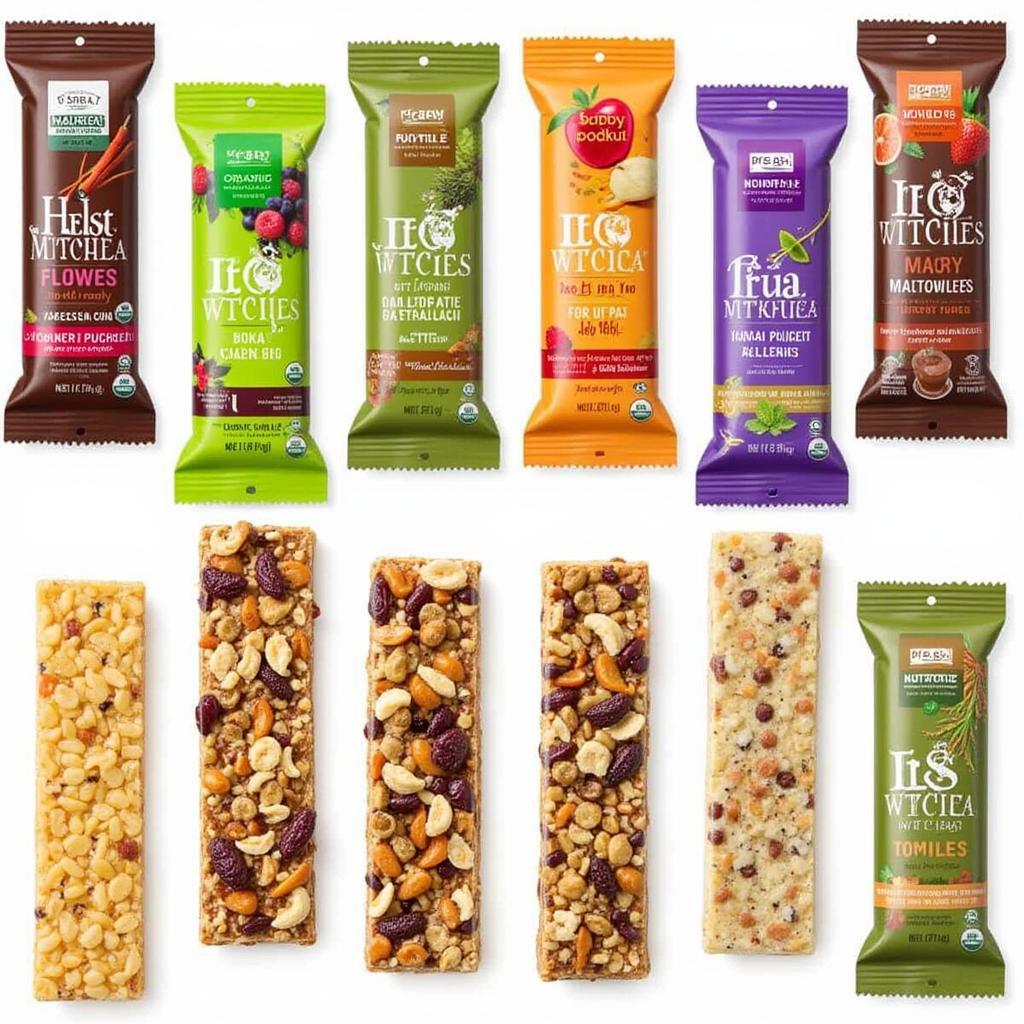Organic Food Bars have become increasingly popular, offering a convenient and often healthy snack option for people on the go. But what exactly makes a food bar “organic,” and how can you choose the best one for your needs? This guide delves into the world of organic food bars, exploring their benefits, ingredients, and how to navigate the sometimes-confusing landscape of organic certifications. Let’s dive in!
What Are Organic Food Bars?
Organic food bars are snack bars made with ingredients that are certified organic, meaning they are produced according to specific agricultural standards. These standards prioritize sustainability, soil health, and animal welfare. Organic farming prohibits the use of synthetic pesticides, herbicides, and genetically modified organisms (GMOs). Choosing organic food bars offers a way to support these practices while enjoying a quick and tasty snack. For hikers looking for organic options, check out our recommendations for organic hiking food.
Benefits of Choosing Organic
Opting for organic food bars brings several potential benefits. Firstly, it reduces your exposure to potentially harmful pesticides and chemicals. Secondly, organic farming practices contribute to a healthier environment by protecting biodiversity and reducing soil erosion. And for those with specific dietary needs, organic food bars often cater to vegetarian and vegan lifestyles, such as our collection of vegetarian backpacking food.
 Assortment of Organic Food Bars
Assortment of Organic Food Bars
Decoding Organic Certifications
Navigating organic certifications can be tricky. Look for certifications like the USDA Organic seal, which guarantees that at least 95% of the ingredients are organic. Products labeled “made with organic ingredients” contain at least 70% organic ingredients. Understanding these labels empowers you to make informed choices. If you’re prepping for a trip, you might also be interested in our survival gear and food guide.
Common Ingredients in Organic Food Bars
Many organic food bars rely on wholesome ingredients like nuts, seeds, dried fruits, and whole grains. These ingredients provide fiber, protein, and healthy fats, making them a nutritious snack option. However, it’s important to read ingredient lists carefully, as some bars may contain added sugars or processed ingredients, even if they are certified organic.
 Close-up of Organic Food Bar Ingredients
Close-up of Organic Food Bar Ingredients
Choosing the Right Organic Food Bar
When selecting organic food bars, consider your individual needs and preferences. Are you looking for a high-protein bar for a post-workout snack? Do you need a gluten-free option? Pay attention to the sugar content and choose bars with natural sweeteners like dates or honey whenever possible. If you’re interested in exploring food and beverage options during your travels, take a look at our hotel food and beverage recommendations.
Are Organic Food Bars More Expensive?
Organic food bars are generally slightly more expensive than conventional food bars due to the higher production costs associated with organic farming. However, many people consider the potential health and environmental benefits to be worth the extra cost.
Organic Food Bars for Specific Diets
Organic food bars cater to a wide range of dietary needs. You can find vegan, gluten-free, and paleo-friendly options. Some bars are also fortified with vitamins and minerals, catering to specific nutritional requirements. If you are interested in food plots for wildlife, you might want to check out our guide on winter rye food plots.
Conclusion
Organic food bars offer a convenient and often healthy snacking option. By understanding organic certifications and reading ingredient lists carefully, you can choose bars that align with your health and environmental values. While they may be slightly more expensive, the potential benefits of choosing organic make them a worthwhile investment for many consumers. Remember to check for the USDA Organic seal to ensure you’re getting a truly organic product.
FAQ
- What does the USDA Organic seal mean? It signifies that at least 95% of the ingredients are organic.
- Are all organic food bars healthy? Not necessarily. Some may contain added sugars or processed ingredients.
- Where can I buy organic food bars? They are widely available in health food stores, supermarkets, and online retailers.
- Are organic food bars suitable for children? Yes, many organic food bars are appropriate for children, but check the ingredient list for allergens and added sugars.
- Can organic food bars be part of a weight-loss diet? Yes, as long as they are consumed in moderation as part of a balanced diet.
- Are there organic food bars for athletes? Yes, many brands offer high-protein organic food bars specifically designed for athletes.
- How long do organic food bars typically last? Check the expiration date on the packaging, but they usually have a shelf life of several months.
Are you curious about other food options for specific activities? Learn more about organic hiking food and vegetarian backpacking food on our website. For information on prepping for emergencies, check out survival gear and food. Finally, when planning your travels, explore hotel food and beverage choices or even consider unique options like a winter rye food plot if you’re interested in wildlife management.
For further assistance, contact us at Phone Number: 02437655121, Email: minacones@gmail.com, or visit us at 3PGH+8R9, ĐT70A, thôn Trung, Bắc Từ Liêm, Hà Nội, Việt Nam. We have a 24/7 customer service team ready to assist you.